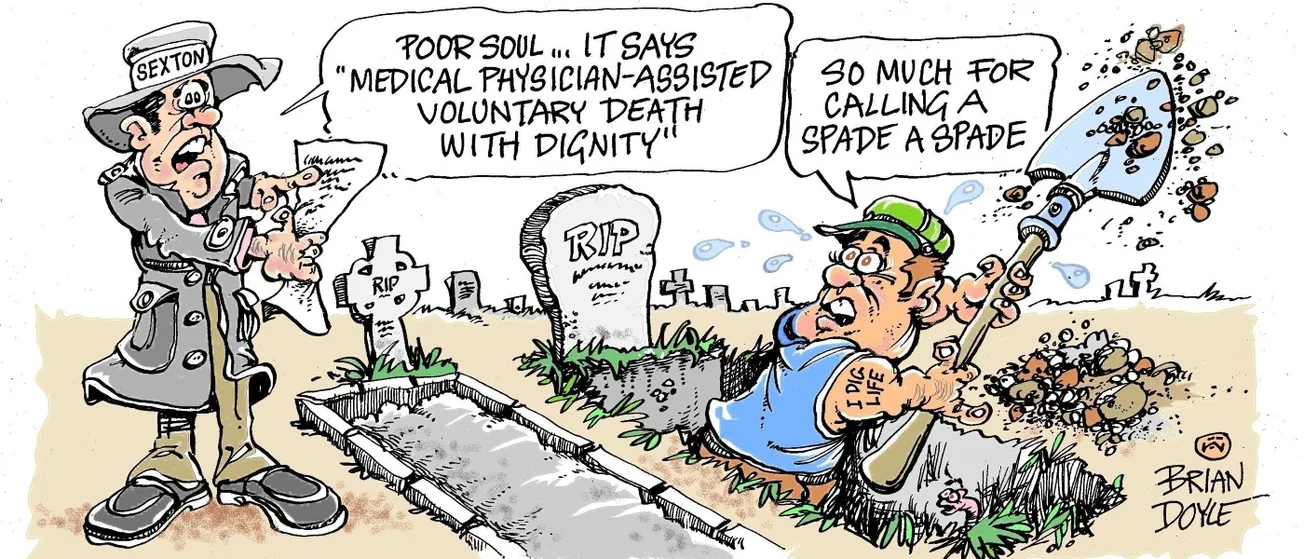Table of Contents
Michael Cook
Michael Cook is editor of Mercator.
Such is the stigma surrounding suicide that advocates of ‘voluntary assisted dying’ insist vehemently that it is by no means suicide.
For instance, Go Gentle Australia, a leading lobby group for VAD, explains in its website’s FAQ that:
People seeking voluntary assisted dying are not suicidal; they don’t want to die but are dying of a terminal illness and simply want to control how and when it happens and how much they need to suffer at the end. Australian laws expressly state that voluntary assisted dying is not suicide.
In Australia, this is more than a quibble over words. In 2005 the Federal government amended the Commonwealth Criminal Code Act 1995. It introduced two sections which criminalised counselling or instructing people about suicide over “carriage services”, which included communication over telephones and the internet.
It had good reason to do so. Access to the internet was growing and young people were being bullied or coaxed into killing themselves in internet chatrooms. Introducing the bill at the time, the Attorney-General explained that “internet chat room discussions have led to a person attempting suicide, and sometimes successfully. This research points to evidence that vulnerable individuals were compelled so strongly by others to take their own lives that they felt to back out or seek help would involve losing face.”
Chatrooms in Japan were particularly gruesome. In 2003, NBC News reported that strangers were organising suicide pacts over the internet. In one shocking case, four young men, all strangers, met to gas themselves in a car overlooking Mount Fuji.
Furthermore, Dr Philip Nitschke, an Australian assisted suicide promoter and facilitator, began providing information about suicide techniques over the internet. At the time, the changes were even dubbed “the Nitschke amendment”.
The dangers have, if anything, increased.
Earlier this year a Canadian man, Kenneth Law, was arrested after a newspaper investigation disclosed that he had allegedly mailed more than 1200 suicide kits to people who contacted him on now-defunct websites with names like “Imtime Cuisine” and “Escape Mode”. He has been linked to more than 120 deaths across the globe.
However, now that all of Australia’s states have legalised VAD, the Federal criminal code has become, in the words of advocates, a barrier to access, because it equates VAD with suicide. People in rural areas who want to access VAD may not be able to find a cooperative doctor. For other medical consultations, they would be able to speak over the phone with a specialist. But for VAD, such a consultation would be a crime. It purportedly causes “delay and hardship for patients” who want to die.
So a doctor from Victoria, Nicholas Carr, recently asked the Federal Court to rule that ‘voluntary assisted dying’ is not suicide. The judge, Justice Wendy Abraham, refused.
After a long examination of the relevant legislation and parsing the word suicide, she concluded that “in so far as the VAD Act purports to authorise medical practitioners to provide information about particular methods of committing suicide via a carriage service, it purports to authorise them to engage in conduct that the Criminal Code has criminalised.”
Taking a common sense approach to the definition, Justice Abraham consulted Australia’s Macquarie Dictionary and the Oxford English Dictionary. They supported her stand. Suicide is “the intentional taking of one’s own life, and the act of doing so” and therefore VAD is suicide. QED.
Dr Carr’s lawyers had another argument: an ingenious one. The Federal legislation bans incitement “to commit suicide”. The word commit is associated with committing a sin or committing a crime; one must obviously conclude that only stigmatised species of suicide are banned.
Justice Abraham gave this objection short shrift. “There is no basis to infer, from the text, context or purpose of the provisions that the word ‘commit’ was chosen by Parliament to denote that the term ‘suicide’ only applies to certain circumstances in which one takes one’s own life.”
When there is a clash between state and Federal law in Australia, Federal law prevails. For the moment, no one in Australia can use a telephone or the internet to give advice about VAD. To solve the ‘access’ problem, the states need to draft laws which will allow doctors to give advice about ‘voluntary assisted dying’ but which, at the same time, stop people from egging on unbalanced people to end their lives. Good luck with that.
Justice Abraham’s ruling is a welcome example of reality-based reasoning. Too often assisted suicide and euthanasia are given the lipstick-on-a-pig treatment – fancy words for grim realities. One of the most egregious examples is the fact that doctors are instructed to record on death certificates that the cause of death was the underlying condition rather than euthanasia or assisted suicide. That is a state-sanctioned lie.
George Orwell’s métier was politics, but his observations about the corruption of words can equally be applied to many controversies in bioethics. As he wrote in his famous essay, “Politics and the English Language”, realities “which are too brutal for most people to face” are covered up by a “catalogue of swindles and perversions”.
‘Voluntary assisted dying’. ‘Physician-assisted dying’. ‘Medical assistance in dying’. ‘Death with dignity’. They are all euphemisms for suicide. Suicide is suicide is suicide. If that sounds ugly, it’s because it is. Thank you, Justice Abraham.









